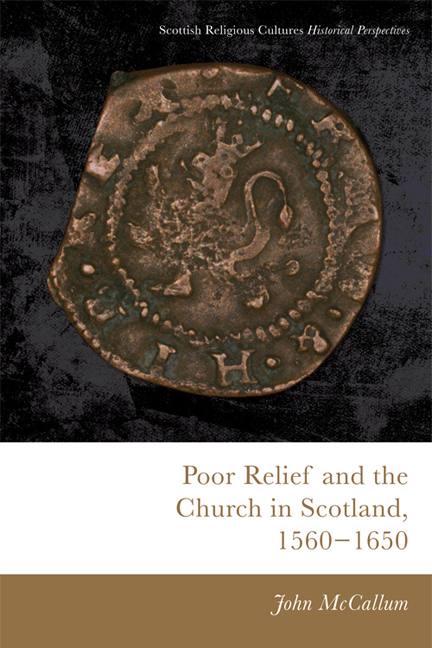Book contents
- Frontmatter
- Contents
- List of Tables
- Acknowledgements
- Conventions
- Abbreviations
- Map of Key Locations Mentioned
- Introduction
- 1 Ideas, Attitudes and Ambitions
- Part I The Development of Kirk Session Poor Relief
- Part II The Nature of Kirk Session Poor Relief
- Conclusion
- Appendix Equivalent Values from Wages and Prices
- Bibliography
- Index
Introduction
Published online by Cambridge University Press: 14 September 2018
- Frontmatter
- Contents
- List of Tables
- Acknowledgements
- Conventions
- Abbreviations
- Map of Key Locations Mentioned
- Introduction
- 1 Ideas, Attitudes and Ambitions
- Part I The Development of Kirk Session Poor Relief
- Part II The Nature of Kirk Session Poor Relief
- Conclusion
- Appendix Equivalent Values from Wages and Prices
- Bibliography
- Index
Summary
The church that emerged from the Protestant Reformation of 1559–60 influenced the lives of Scots in countless ways. One of the most striking and novel ways in which it made its presence felt was through its kirk sessions. These new parish courts came to represent the local face and authority of the church, and we have come to learn a great deal about their impact on ordinary people's religion and personal lives – not least through their punishment of ‘ungodly’ behaviour, and the inculcation and mediation of new religious ideology. This book is about an aspect of the church's role in Scottish communities which is much less familiar. The kirk sessions were also the principal providers of poor relief. This mission reflected some of the foundational aspirations and rhetoric of the Reformation's leaders, but more than that, it became a duty which they undertook over the long term with much consistency, effort, and resilience. This relief has not been studied in any depth, especially for the first phase after the official and legal establishment of Protestantism in 1560 up until the mid-seventeenth century.
This book seeks to address this gap, and to argue that the poor relief undertaken by the kirk sessions was more effective, substantial, and wideranging than has been assumed. Moreover, it suggests that kirk sessions were uniquely suited to administer welfare in the context of sixteenth- and seventeenth-century Scotland, primarily, though not solely, through public collections. They were also well-placed to know (and judge) the local poor and to operate relief with some flexibility and responsiveness. This work – deeply integrated with other elements of their reforming agenda – is an important and neglected strand in the story of the Scottish Reformation, as well as the longer term history of Scottish welfare. On a wider scale, poor relief in pre-industrial Europe, and especially the reforms and developments of the sixteenth century, have received a great deal of attention from historians. Scotland is normally present as an afterthought (at best) in wider or comparative studies, but the health, durability and resilience of this local, voluntary and ecclesiastical relief system offers a new perspective on wider developments in sixteenth- and seventeenth-century poor relief.
- Type
- Chapter
- Information
- Poor Relief and the Church in Scotland, 1560–1650 , pp. 1 - 26Publisher: Edinburgh University PressPrint publication year: 2017

